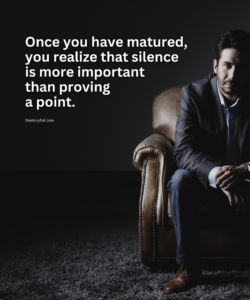5 Signs of Guilt You Should Never Ignore
Guilt is an indirect form of communication that makes the recipient feel guilty or uneasy. They are prevalent in intimate relationships where both parties are concerned about the feelings of the other. In other, further-apart relationships, manipulative strategies may be employed, but they are less likely to elicit guilt on either side.
Many consider guilt trips to be coincidental. Normally, we feel remorseful when we stress that we have harmed somebody we care about, or when we feel that we have not done our reasonable portion of something. As a result, having someone point it out can be enough to make you feel guilty, which is not necessarily a bad thing.
However, there are those who control others through guilt. These harmful individuals utilize this and different types of close to home coercion to drive others to do what they need. If you’re not sure if someone is behaving this way toward you, look for these five clues that someone is attempting to achieve their goals by employing traditional guilt.
1. Somebody Utilizing Culpability Raises Your Previous Mistake.
Close to home extortion can be decided to dissipate culpability by bringing up the individual’s previous wrongdoings that made you stagger.They act as though the other person is innocent and undeserving, and that they are always doing bad things.
Talking about and referring to past mistakes in a calculated manner to make the other person feel bad and do something about it is common form of this kind of abuse. You discover that guilty and toxic individuals frequently play the victim, and this is certainly the case here.

Naturally, we are not discussing highlighting typical relationship issues that require treatment. This does not mean that you cannot or should not discuss challenging negative patterns that you have observed. However, such a discussion has its place and time. In addition, it is a chance to do so in a respectful and productive manner.
In particular, guilt stems from past wrongdoing and concerns the following:
- Already been resolved and moved,
- Neither party ever raised them as a problem,
- It took place in a way that is unusual. They are introduced to guilt feelings.
2. They demonstrate their Prior Rights
Which backs up the previous assertion. In addition to highlighting the wrongdoings of others, the guilt tripper frequently highlights his own good deeds. They show you or your group a list of their activities and compare your actions to them. They might say, for instance:
- You’re treating me this way when I’ve done so much for you.
- You were unable to even wish me a happy birthday, even though I never forgot important dates
- Working a lot of extra hours at this job is frustrating because everyone else is taking vacation.
Again, there are some subtleties here. These kinds of issues can be brought up in a respectful and productive manner. However, someone who uses traditional guilt as a control tool emphasizes these differences to portray your innocence and cruelty.
A sign of manipulative guilt is when you start to believe that every good thing someone does will eventually be used against you.
3. A person using guilt strongly avoids conflict
Because the parties involved focus on their feelings and thoughts, direct conflict can frequently lose the seriousness of guilt for those who use guilt to avoid conflict. People who use traditional guilt don’t want that to happen for them to be able to avoid engaging in violent conflicts, they still need to believe that they are martyred and innocent.
As a result, classic blamers seek to convey their message by avoiding conflict. You feel guilty and irritated by these avoidance strategies. This can be accomplished in most cases in the following ways:
-
Classic fault can use quiet processing
Because the goal of quiet processing is to fill in the gaps on your own. A responsibility traveler might pick total inaction, overlooking and stalling you, leaving you feeling befuddled and frantic. You do everything you can to calm them down and determine what’s wrong.
-
Denial of Emotions as a Method of Manipulation
If you ask the abuser directly if there is anything wrong, he may stutter and say that everything is fine. Their actions contradict what they say in their mouth. They clearly act as if nothing is wrong after telling you that everything is fine. You may try to please them in an effort to avoid the issues you believe you are causing because this makes you feel awkward and uneasy.

-
Only Body Language
The majority of the time, a person learns a lot of body language by default. This indicates that guilt can communicate nonverbally and avoid direct conflicts. They express their displeasure with you by shaking their heads, crossing their arms, or adopting an attitude.
To avoid conflict, some people, after all, try to keep their feelings to themselves. However, the tormentor does not conceal his emotions; rather, he finds other means of expressing them. This way, you feel guilty and feel the pressure of their feelings, and they can’t really say they’re not doing anything to get you interested.
4. A person who uses guilt to appeal to feelings
Emotional appeals are common in all forms of communication.The majority of people are aware that making others feel something about something is the easiest way to get them to do something. This will be used to their full advantage by someone who wants to make you feel bad. This can be done by:
-
Inventing Emotional Responses
A person who uses traditional guilt might make you feel bad by exaggerating their feelings. Even if they don’t mean it, they might start crying or act like you completely broke their heart. Naturally, it’s critical to keep in mind that not all emotional responses are manipulative. However, if someone over exaggerates their emotions, they are only attempting to persuade you to do everything in your power to prevent them from continuing their reactions.
-
Having a negative emotion
No one wants to deal with negative emotions. In the event that you feel something negative, you presumably need to dispose of it quickly. This is known and used against you by reckless hikers. They mention how your actions make them feel loved, which makes you so sad that you are willing to do anything to make them feel loved once more. Because they claim you never comply with their requests, you feel compelled to comply in order to alleviate their discomfort.
-
Arousing sympathy in a manipulative way
Someone who wants to make you feel bad is trying to take away your natural sympathy for them you want to do things for them if you are nice!
5. Someone who uses blame tactics acts as if they did
A controlling and manipulative will act as if they were blaming you in some way when they employ blame tactics. They might act morally, intellectually, or physically superior to you in order to make you feel inferior, according to research.
Through moral education, these individuals can influence their actions. They act as though they are teaching you something you don’t understand. They assert that your current behavior is inferior and that the behavior they want from you is somehow the “right” behavior.
Having true wisdom guide someone is very different from simply improving your own definition. You won’t feel better if you learn the truth from someone who uses classic guilt. They want you to follow their orders and stay in line. These are some of the ways they can go about it:
- Using harsh language like “tough love” and framing it as if your interests would most likely accept you
- Assuming that they are obligated to be liable for you in some way or that they have automatic power over you.
- Purposefully manipulates the areas of your life that you are most sensitive to get you to cooperate.
This also indicates that they frequently place all liability or responsibility on you. It is deceptive! They will completely disregard you if you attempt to present your side of the story or highlight something harmful they did. They might attribute everything to you:
- Insist that their negative behavior is solely the result of your negative behavior
- Justify their manipulative behavior by jumping through a number of mental hoops
- Insist that you rightfully deserve the negative actions they take when they deserve it to you did nothing

Final Thoughts on the Signs That Someone Is Using Guilt to Get What They Want
Guilt is a very complex emotion, Some good things come from this feeling, and it’s normal and healthy to feel guilty about some things. When you use this feeling to advocate for positive change, healing, or accountability, this is especially true.
In addition, manipulation does not always result in guilt. about how simple it is for our other close relationships to make us feel guilty. In point of fact, either by chance or through genuine communication it can occur. Whether the relationship is platonic, professional, familial, or romantic, someone can demonstrate that they did their part by pointing out that you are not doing yours.
Nuanced is the issue of guilty tripping. It might be a genuine effort on the part of someone to motivate positive and necessary change. However, even the best-laid plans can backfire. Also, obviously individuals utilize this stunt to get what they need from others.
Lastly, if someone uses the standard excuse of guilt to get what they want, the situation needs to be viewed with nuance and comprehension. You will be able to identify toxic people who engage in this kind of manipulation so that you can respond or let go. Learn how to respond constructively to every manipulative tactic and watch for signs of guilt!




